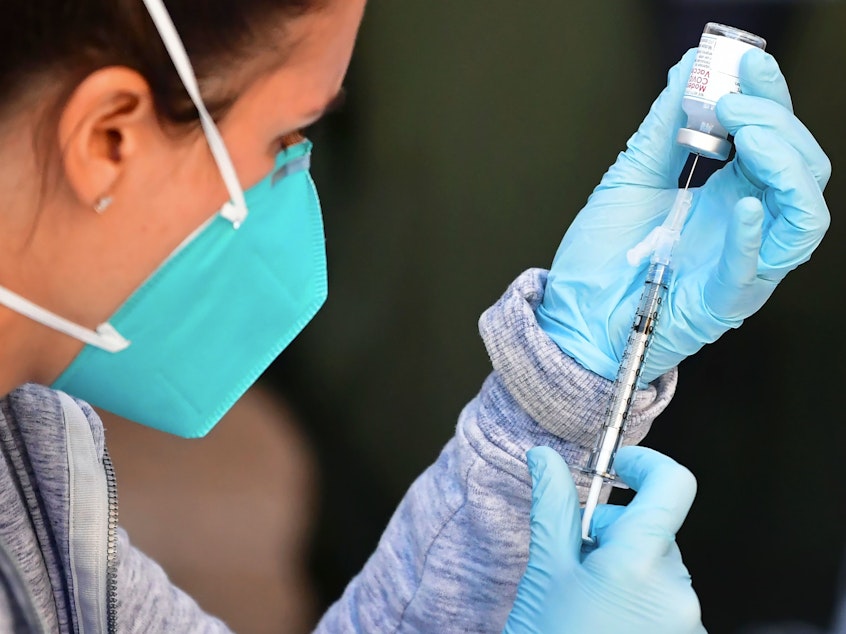Why your health provider doesn't have the coronavirus vaccine: It may come down to influence

Sandra is a 74-year-old woman from Seattle who has diabetes and kidney failure.
That means she’s at risk for very bad outcomes if she gets Covid — but she couldn’t get a vaccine appointment.
“I am not online, so I wasn’t able to go search for different sites around the area that were giving the vaccine,” said Sandra, who asked not to use her last name to protect her privacy. “And I don’t drive anymore, so it was going to be very difficult just to get to a site.”
She wanted to get a shot at the Northwest Kidney Centers, where she is three times a week for life-saving dialysis. But they had no doses for any of their patients — even though Washington state’s Department of Health (DOH) had approved them to receive vaccines.
They’re not alone. More than half of health care centers and clinics that DOH has approved to receive vaccines haven’t gotten doses — zero, despite asking for them week after week. Frustrated, doctors and nurses are taking matters into their own hands to appeal to the state to prioritize their patients.
“We’d been advocating at every angle,” said Dr. Suzanne Watnick, chief medical officer at the Northwest Kidney Centers.
She said many of her patients, like Sandra, don’t have cars or internet access. Many don’t speak English. And they need vaccines soon because, if they contract Covid, dialysis patients are much more likely to die than other people of the same age. She wants to make it as easy as possible for them to get their vaccines.
Sponsored
“Many of them are quite chronically ill or debilitated,” Watnick said. “And they are put at risk potentially just waiting in a line at a drugstore or clinic for vaccine.”
But, week after week, the organization asked the state for vaccines and got none.
Demand is high and supply is low. The state Department of Health said in an email that they look at many factors when they make allocation decisions, including the number of eligible people in each county, a provider’s capacity to store and administer vaccines, and prioritizing providers that serve high-risk populations.
Watnick said providers like Northwest Kidney Centers meet all the criteria. And she finds the system is somewhat of a black box — it’s unclear why certain providers get big shipments while others get no vaccines at all.
That’s why providers end up working every possible angle to get vaccines for their patients.
Sponsored
“The county knew about us; the state knew about us; people from the governor’s office, the Washington State Hospital Association, state legislators had all put in a plug for us,” Watnick said.
On the other side of the mountains, the Yakima Valley Farm Workers’ Clinic also never got doses it requested.
Lori Kelley is their director of quality. She said, in a good week, the clinics get about 10 percent of the doses they ask for. Other weeks, they get none.
“The state of Washington has not prioritized community health centers,” Kelley said.
Kelley said the farm workers’ clinics, like the Northwest Kidney Centers, serve a vulnerable community — and are places their patients are willing and able to go.
Sponsored
“Our patients are not necessarily going to go to mass vaccination sites,” she said. “They are not going to go to pharmacies. They're going to go to the people that they trust, which is their community health care center.”
A couple months into the vaccine rollout, the state Department of Health did agree to allocate a bigger piece of the pie to community health centers as a whole, but Kelley said she hasn’t seen an increase.
“We've written to the governor's office, and we've written to DOH,” she said. “I don't feel like my questions are being answered; I don't feel like our concerns are being addressed.”
Washington state’s Department of Health would not answer questions from KUOW about what role advocacy plays in their vaccine allocation decisions, but they did say they factor in a provider’s input about their vaccination plans and priorities.
So, does the squeaky wheel get the dose?
Sponsored
Here are two examples: Snohomish County and a different dialysis provider, Puget Sound Kidney Centers, spent weeks and sometimes months advocating for doses, and then finally got vaccines from the state.
As for Northwest Kidney Centers, their advocacy eventually seemed to pay off. In mid-February, they finally got 500 vaccine doses, even though the state’s supply was still pretty low, and more than 700 of the clinics, hospitals and health care centers the state has approved to administer Covid vaccines still haven’t seen a single dose.
“We were thrilled to find out that we received some vaccine, and we were able to use every last dose,” Watnick said.
She said she wishes it were a more transparent system, and that providers serving vulnerable patients had a clear way to get doses.
But, she added, given how the system has been set up, if providers want doses for their patients, “My advice is to use every avenue possible to try to advocate for patients — for the people that you serve, for those that may not be able to access care as easily as others.”
Sponsored
Watnick said she’s not finished with her advocacy: the kidney centers still need several hundred more doses to vaccinate all of their eligible patients.




